What does rose tea taste like? The answer is that it has a delicate, floral flavor with a slightly sweet taste.
When you brew rose tea, the aroma of the tea is the first thing you’ll notice. It has a pleasant, floral fragrance that is similar to the scent of fresh roses. As you take a sip, you’ll notice that the tea has a light, refreshing taste that is not overpowering. The sweetness of the tea is subtle, making it a great alternative to sugary drinks.
Rose tea is a delectable beverage for anyone who loves floral flavors. It can be enjoyed hot or cold and sweetened with honey or other natural sweeteners.
Keep reading to find out more about this interesting tea!
Please note: This article contains affiliate links, meaning I may earn a commission if you make a purchase by clicking a link. Of course, this comes at no extra cost to you and helps me keep offering readers solid information.
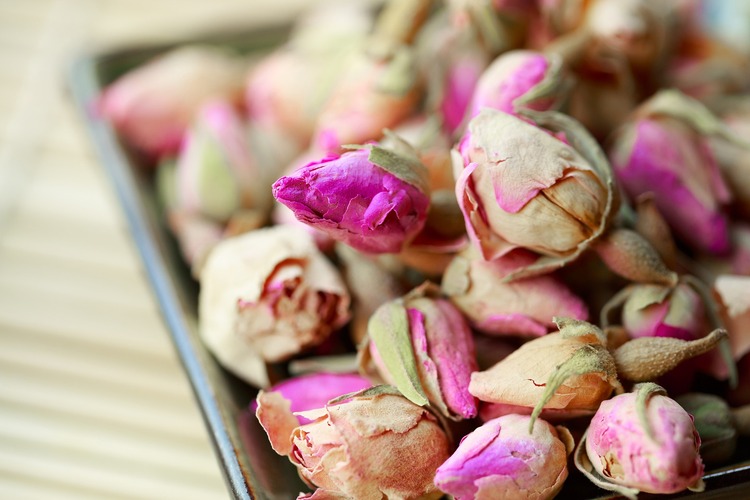
What is Rose Tea?
If you’re wondering what rose tea tastes like, you first need to know what it is. Rose tea is a fragrant and delicate tea made from rose petals. These petals are usually harvested from the Rosa damascena or Rosa centifolia species of roses, known for their quality and aroma. The tea is caffeine-free, making it a great alternative to traditional tea blends.
Rose tea is made by steeping fresh or dried rose petals in hot water, just like tea leaves. Some tea blends include rosehips, the rose plant’s fruit. Rosehips are rich in vitamin C, polyphenols, and anthocyanins.
When making rose tea, it’s important to use petals free of pesticides and other harmful chemicals. You can purchase dried petals from a reputable supplier or harvest them yourself (if you can access pesticide-free roses).
To make rose tea, add the petals to a teapot or infuser and pour hot water over them. Allow the tea to steep for several minutes before straining out the petals and enjoying the fragrant and delicate flavor.
What Does Rose Tea Taste Like?
Below, we break down the flavor profile of rose tea.
- Floral: The dominant and most characteristic flavor in rose tea is the floral note of roses. It imparts a pleasant and fragrant taste reminiscent of fresh rose petals. This floral quality can vary in intensity depending on the rose used and the brewing method.
- Sweetness: Rose tea often has a natural sweetness that is subtle but discernible. This sweetness complements the floral notes.
- Aromatic: The aroma of rose tea is just as important as its taste. The fragrance of the tea is rich and soothing, offering a sensory experience that can be quite calming and enjoyable.
- Fruity Undertones: Depending on the specific type of roses used and the blending choices, you may detect mild fruity undertones, which can range from hints of citrus to berry-like notes. These nuances add another layer of complexity to the tea’s flavor.
- Herbal and Grassiness: Sometimes, you may perceive herbal or grassy undertones. These elements can create a refreshing and invigorating quality in the tea.
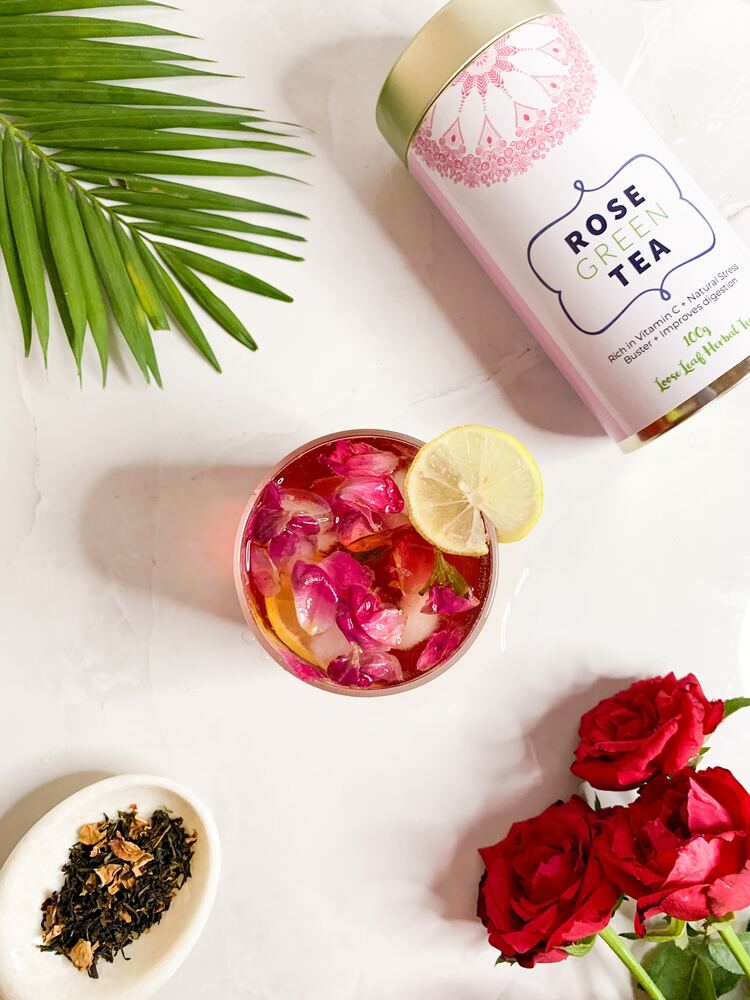
Rose Tea Blends
Rose petals can be mixed with a lot of different ingredients. Below, we present some of the most popular blends.
Herbal Tea
Rose petals are often blended with other herbal teas to create particular flavor profiles. For example, blends of rose petals with chamomile, lavender, or peppermint are well-liked. These herbs and flowers add a depth of flavor to rose tea.
Green Tea
A blend of green tea and rose petals is a perfect combination. The delicate flavor of green tea pairs well with the subtle sweetness of roses. The combination creates a refreshing and calming beverage that is perfect for any time of day.
Black Tea
Black tea and rose petals blends are another popular combination. The delicate floral notes of roses balance the bold flavor of black tea. This combination creates a robust beverage for those who prefer a stronger tea.
Oolong Tea
Oolong tea is a type of tea that is in between green and black tea. The flavor of oolong tea is complex and can be described as a combination of floral, fruity, and nutty notes. When combined with rose petals, you end up with a fragrant and tasteful flavor profile.
Tea Blends
Rose petals are often combined with well-known tea blends to create distinctive flavor profiles. For example, roses can be added to Jasmine or Earl Grey teas.
Rose Chai Tea
Rose chai is a fusion of traditional Indian spiced tea (chai) with the addition of rose petals. This variation adds a floral twist to chai spices’ bold and aromatic flavors like cinnamon, cardamom, ginger, and cloves.
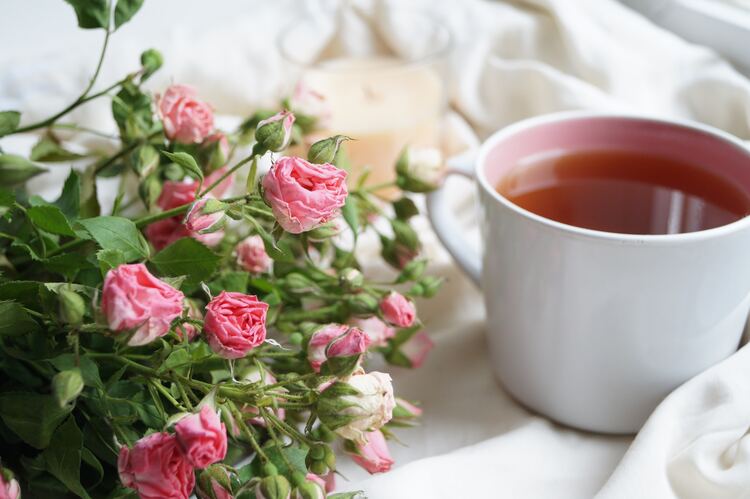
Rose Tea Variations
Rose tea can be used to prepare a variety of delightful beverages. Here are some options:
Iced Rose Tea
Iced rose tea is a refreshing beverage perfect for hot summer days. To make iced rose tea, brew a cup of hot rose tea and let it cool. Once cooled, pour the tea over ice and enjoy.
Rose Milk Tea
Rose milk tea is a popular beverage in Asia. To make rose milk tea, brew a cup of black tea. Add 2 tablespoons of dried rose petals or 4-5 fresh rose petals when the tea is steeping. Add milk and sugar to taste. The resulting beverage is creamy and fragrant.
This beverage can be prepared with rose syrup as well.
Bubble Tea
Bubble tea is a popular drink that originated in Taiwan. It is a refreshing beverage often made with tea, milk, and sugar. Rose tea is a popular base for bubble tea (instead of using black or green tea) and is often paired with tapioca pearls.
Rose Lemonade
Mix rose tea with freshly squeezed lemon juice and sweeten it with sugar or a natural sweetener like agave syrup. Dilute it with water, add ice cubes, and garnish with lemon slices or fresh rose petals for a vibrant and tangy drink.
Rose Smoothie
Blend rose tea with frozen fruits like strawberries, raspberries, or peaches, a yogurt splash, or a dairy-free alternative. It creates a creamy and floral smoothie with a hint of sweetness.
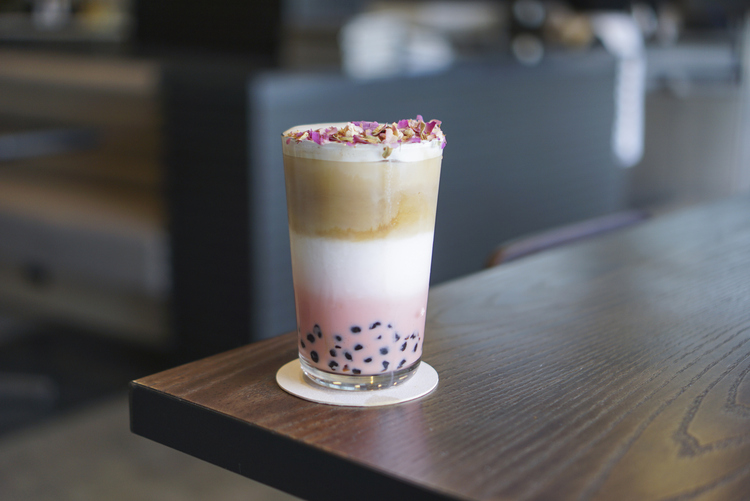
Food Pairings
Rose tea can be paired with various foods to create enjoyable flavor combinations. Here are some food suggestions that pair well with this tea:
Light Pastries
Delicate pastries like rose-flavored macarons, shortbread cookies, or almond biscotti complement the floral notes of rose tea without overpowering its subtle flavors.
Floral-infused Desserts
Pair rose tea with desserts that incorporate floral flavors, such as lavender-infused cakes, jasmine rice pudding, or elderflower cupcakes. These desserts harmonize with the floral essence of the tea.
Fresh Fruits
Serve a platter of fresh fruits alongside rose tea. Fruits like strawberries, raspberries, lychee, or watermelon provide a refreshing contrast to the tea’s floral profile.
Cheese and Crackers
Mild and creamy cheeses like goat cheese, brie, or camembert can be enjoyed with crackers or bread. The smoothness of the cheese complements the delicate flavors of the tea.
Light Sandwiches
Opt for light and subtle sandwiches like cucumber and cream cheese, smoked salmon with dill, or turkey and cranberry. These sandwiches allow the flavors of the tea to shine through.
Scones with Jam
Enjoy classic scones with a spread of rose-infused jam or preserves. The buttery scone and floral jam pair wonderfully with rose tea.
Pistachios or Almonds
Nuts like pistachios or almonds add a pleasant, crunchy, nutty flavor that compliments the floral character of rose tea. Serve them as a snack alongside your tea.
Middle Eastern Sweets
Delight in Middle Eastern desserts such as baklava, maamoul, or basbousa. These desserts often incorporate rose water or syrup and make a lovely pairing with rose tea.
Remember, taste preferences can vary, so experiment with different foods to find your preferred combinations. The goal is to create a balance where the food and tea flavors enhance each other.

Health Benefits of Rose Tea
If you’re wondering about the health benefits of rose tea, you’ll be happy to know that it has several. Here are some of the main benefits to consider:
Antioxidants
Rose tea is rich in antioxidants, which help to protect the body from harmful free radicals. Free radicals can cause damage to cells and DNA, leading to chronic diseases such as cancer, heart disease, and Alzheimer’s. Antioxidants neutralize these free radicals and prevent them from causing damage.
Relaxation
Rose tea has a calming effect on the body and can help to reduce stress and anxiety. This is due to the presence of natural compounds in the tea that relax the nervous system.
Flavonoids
Rose tea contains flavonoids, natural compounds with anti-inflammatory and anti-cancer properties. Flavonoids can also help to improve cardiovascular health and reduce the risk of heart disease.
Vitamins
Rose tea is a good source of vitamins C and E, which are important for maintaining a healthy immune system. Vitamin C is also important for skin health and can help reduce aging signs.
Immune System
Rose tea can help to strengthen the immune system and protect against infections. This is due to the presence of natural compounds in the tea that have antibacterial and antiviral properties.
Menstrual Pain
Rose tea can help to reduce menstrual pain and cramping. This is due to the presence of natural compounds in the tea that relax the muscles.
Kaempferol and Quercetin
Rose tea contains kaempferol and quercetin, which are natural compounds with anti-inflammatory and antioxidant properties. These compounds can help to reduce the risk of chronic diseases and improve overall health.
Rose tea is a healthy and delicious beverage with several health benefits. Incorporating it into your diet can help to improve your overall health and well-being.
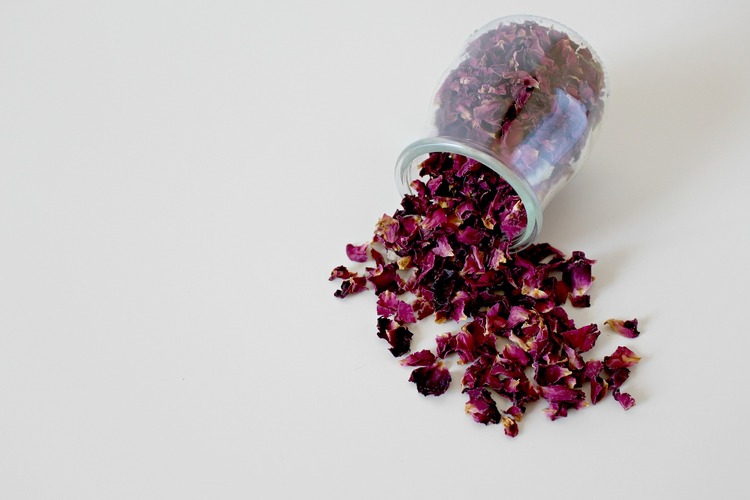
Side Effects and Precautions
Rose tea is generally safe for most people to consume. However, there are a few side effects and precautions to consider when drinking it.
Allergic Reactions
If you have a history of flower allergies, it’s important to be cautious when drinking rose tea. Allergic reactions can include hives, itching, and difficulty breathing. If you experience any of these symptoms, stop drinking the tea and seek medical attention immediately.
Laxative Effect
Rose tea has a mild laxative effect, which can benefit some people. However, if you drink too much of it, you may experience diarrhea or stomach cramps. It’s best to start with a small amount and gradually increase your intake.
Hydration
Rose tea is a diuretic, which means it can cause increased urination and dehydration. Ensure you drink plenty of water throughout the day to stay hydrated.
Tea Roses
Not all roses are safe to consume. Make sure you are using tea roses specifically grown for culinary purposes. Other types of roses may contain pesticides or other harmful chemicals.
Overall, rose tea is a healthy beverage that can provide many benefits. However, it’s important to know the potential side effects and precautions before incorporating them into your diet.
How to Buy Rose Tea
Rose tea is available in various presentations to suit different preferences and brewing methods. Some common presentations include the following:
Loose Leaf
Loose rose tea consists of dried rose petals that can be measured and steeped to the desired strength. This form of rose tea allows for more control over the brewing process and often provides a more aromatic and flavorful cup.
Tea Bags
Many tea companies offer rose tea in convenient tea bags. These bags typically contain a blend of dried rose petals and tea leaves or other herbs (we discussed blend options above). Tea bags are easy to use and are a convenient option for making a quick cup of tea.
Rose Buds
Some presentations of rose tea feature whole rose buds or blossoms, which can be steeped in hot water. These buds are visually appealing and can make for a beautiful cup of tea.
Dried Rose Petals
Dried rose petals can be purchased separately for those who prefer to create their own rose tea blends or infusions by combining them with other tea leaves or herbs.
Powder
Rose petal powder is created by grinding or pulverizing dried rose petals into a fine powder, capturing the essence and beneficial properties of the roses. It can easily be added to teas, lattes, and smoothies.
Rose Tea Extracts
Rose tea extracts or concentrates are also available, which can be diluted with hot water to make a cup of rose tea. These concentrates are particularly handy for quick and consistent preparation.
What Does Rose Tea Taste Like? Buying Recommendations
If you are looking to enjoy this beverage or any of its variations at home, here are our top recommendations:
Organic Rose Flower Rose Petals Tea


The Metropolitan Tea Company Teabags in Wood Box


The Tao of Tea Rose Petal Black Tea

Taimei Teatime Hibiscus Rose Herbal Tea

Hope you have enjoyed the article and learned something new! Until next time, happy sipping!
To you, what does rose tea taste like? Are you a fan of this flavor?
More of Flower Teas
What Does Jasmine Tea Taste Like?
What Does Hibiscus Tea Taste Like?
What Does Lavender Tea Taste Like?
What Does Lavender Milk Tea Taste Like?
What Does Mullein Tea Taste Like?